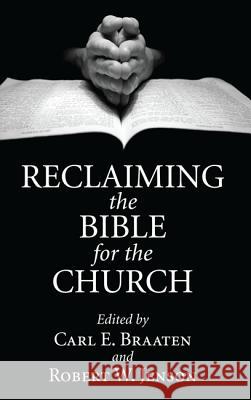Reclaiming the Bible for the Church » książka
Reclaiming the Bible for the Church
ISBN-13: 9781532616853 / Angielski / Miękka / 2016 / 150 str.
Reclaiming the Bible for the Church
ISBN-13: 9781532616853 / Angielski / Miękka / 2016 / 150 str.
(netto: 84,41 VAT: 5%)
Najniższa cena z 30 dni: 87,42
ok. 16-18 dni roboczych.
Darmowa dostawa!
Front-ranking theologians speak out on the crisis of biblical authority and interpretation in the church, focusing in particular on the adequacy of the historical-critical method of hermeneutics. The essays in this volume address from various perspectives the notorious gap between the historical critical approach to the study of the Bible and the churchs liturgical and dogmatic transmission of biblical faith. The authors, following the central theme suggested by Brevard S. Childss ""canonical method"" of biblical interpretation, argue that the historical-critical method does not suffice of itself apart from faith and the church.""These vigorously written and boldly argued essays are not to be missed by anyone who cares about the vitality and authenticity of the churchs life. Many will disagree with them--perhaps vehemently--but those who do should be prepared to think as seriously and as deeply as these theologians have about the role of the Bible in the church.""-LEANDER E. KECK, Yale Divinity School""A compelling account of the dilemma caused by historical criticism of the Bible in the life of the contemporary church. An impressive array of scholarly authorities--Catholic, Protestant, and Orthodox--have come together to argue that while historical criticism is indispensable to the under standing of Scripture, it endangers Christian faith when it is used by educational and bureaucratic elites in mainline churches to accommodate Christ to the ideological demands of secular America.""-WALTER SUNDBERG, Luther SeminaryCarl Edward Braaten is an ordained minister of the Evangelical Lutheran Church in America. He served as a parish pastor of the Lutheran Church of the Messiah in Minneapolis from 1958-1961. From 1961-1991 Braaten served as a professor of systematic theology at the Lutheran School of Theology at Chicago. In 1992 he, together with Robert W. Jenson, founded the Center for Catholic and Evangelical Theology in Northfield, Minnesota. For fifteen years he served as the executive director of the Center, an ecumenical organization whose mission is to cultivate faithfulness to the gospel of Jesus Christ throughout the churches, and also as the editor-in-chief of Pro Ecclesia, a journal of theology published by the Center. Braaten has authored and edited over fifty theological books, including Principles of Lutheran Theology (Fortress, 1983), The Future of God: The Revolutionary Dynamics of Hope (Harper & Row, 1969), Mother Church: Ecclesiology and Ecumenism (Fortress, 1998), Because of Christ: Memoirs of a Lutheran Theologian (Eerdmans, 2010), and Who Is Jesus? Disputed Questions and Answers (Eerdmans, 2011), as well as hundreds of articles and editorials in various academic journals.Braaten was born on January 3, 1929 in St. Paul, Minnesota. He grew up on the island of Madagascar where his parents served as missionaries of the Norwegian Lutheran Church in America. He graduated from Augustana Academy, a Lutheran high school in Canton, South Dakota. He received degrees from St. Olaf College (BA), Luther Seminary (MDiv), and Harvard University Divinity School (ThD). In 1951 he was a Fulbright scholar at the University of Paris (Sorbonne), in 1957 a doctoral student at the University of Heidelberg where he wrote his dissertation, and in 1967 a Guggenheim Fellow at Oxford University. In 1974 he spent a sabbatical making a worldwide lecture tour of various colleges and seminaries in Japan, China, India, Kenya, Tanzania, Madagascar, Peru, Chile, Argentina, Brazil, and Mexico. This tour resulted in a book on the universal mission of the church entitled, The Flaming Center (Fortress, 1977).ROBERT W. JENSON is professor of religion at St. Olaf College in Northfield, Minnesota, and associate director of the Center for Catholic and Evangelical Theology. He is coeditor of the book Either/Or and author of Essays in Theology of Culture.











